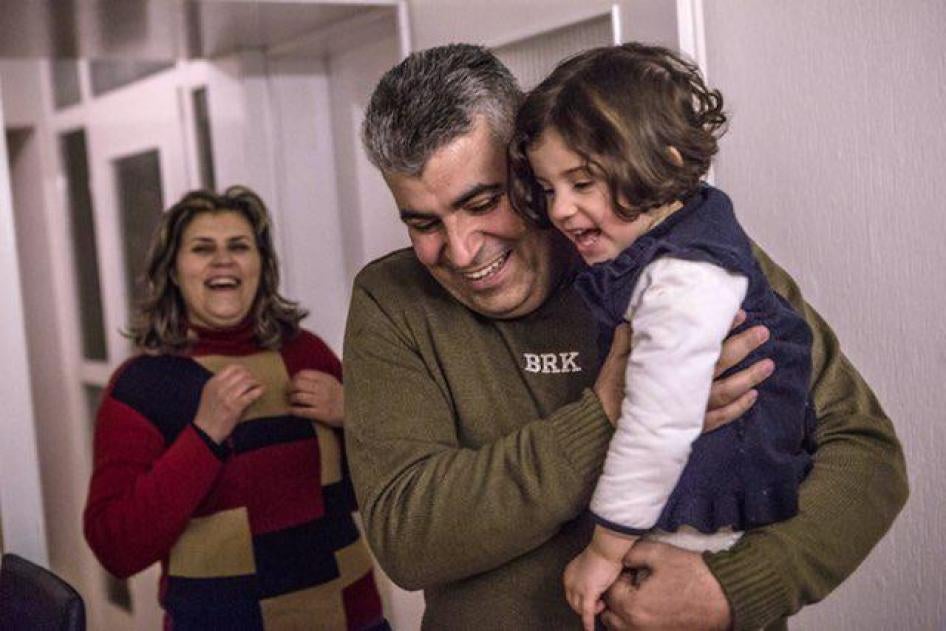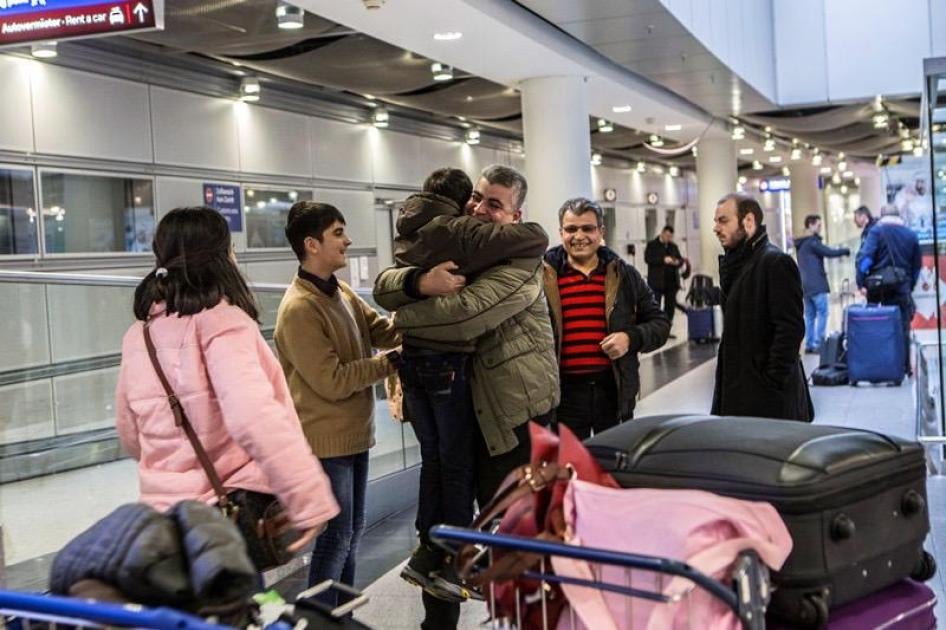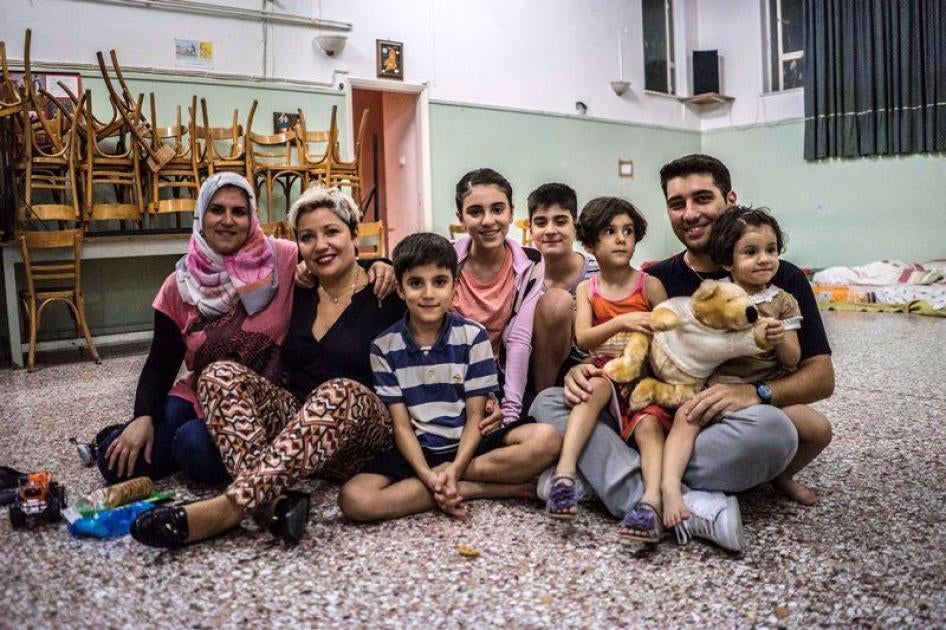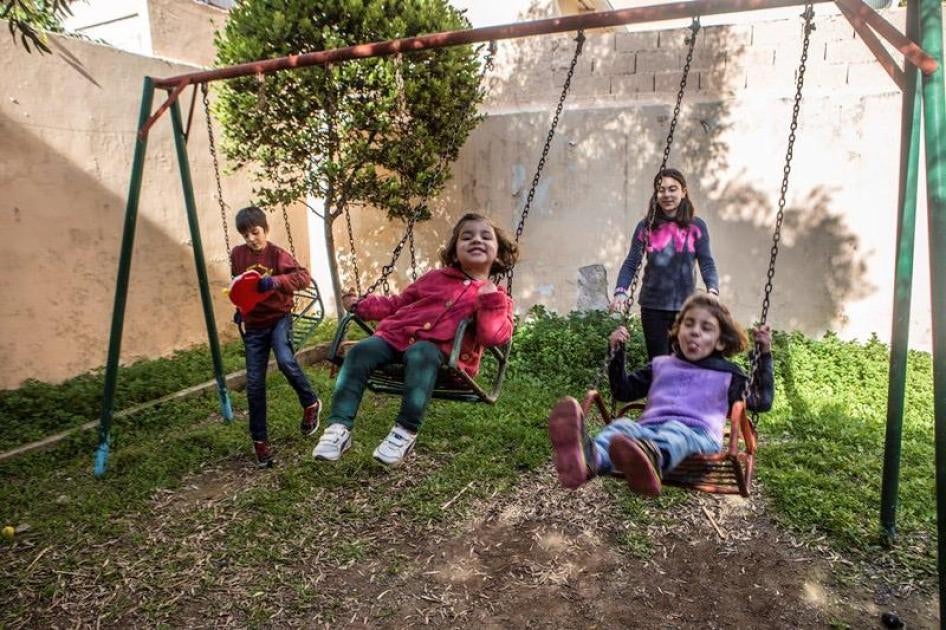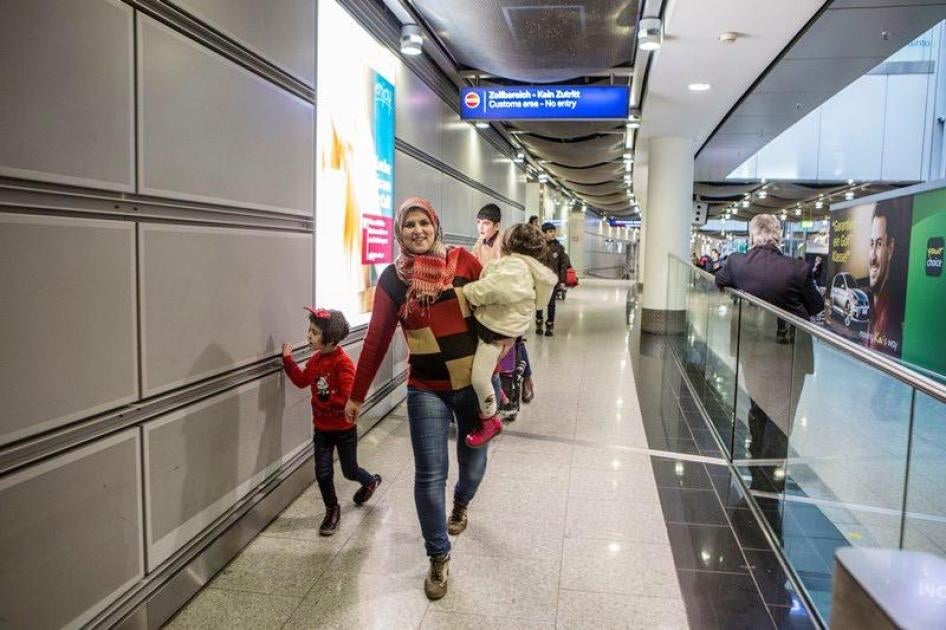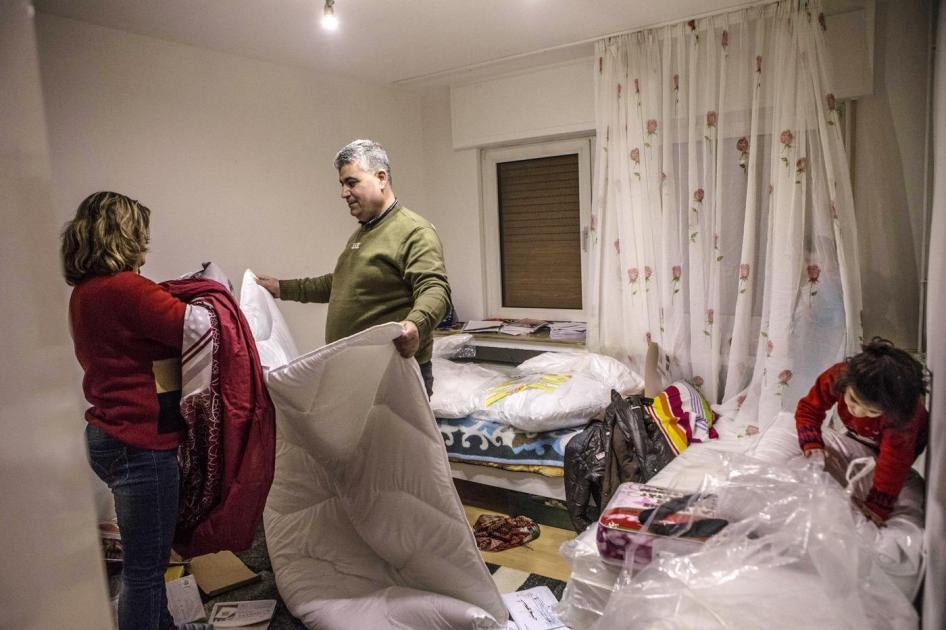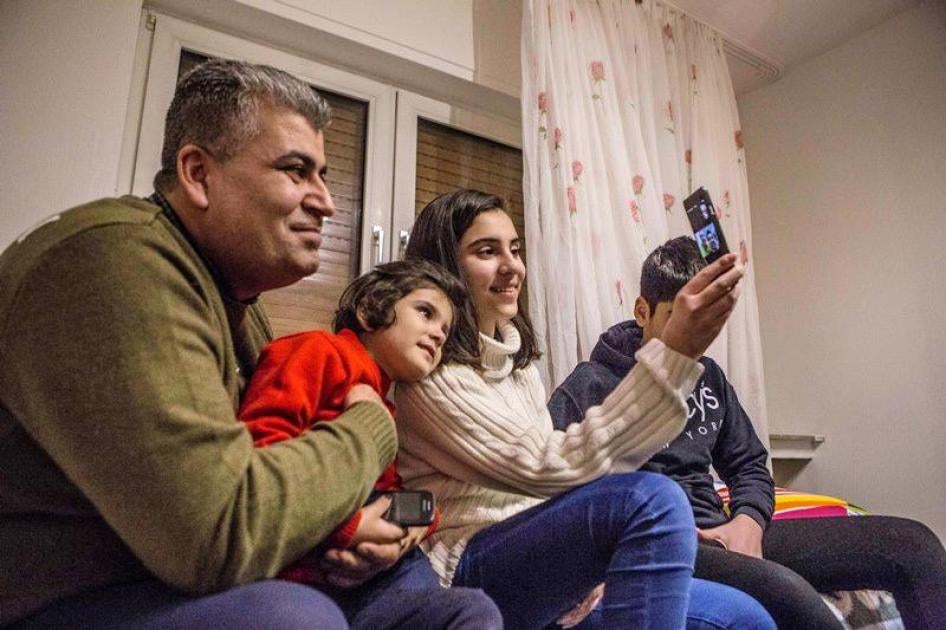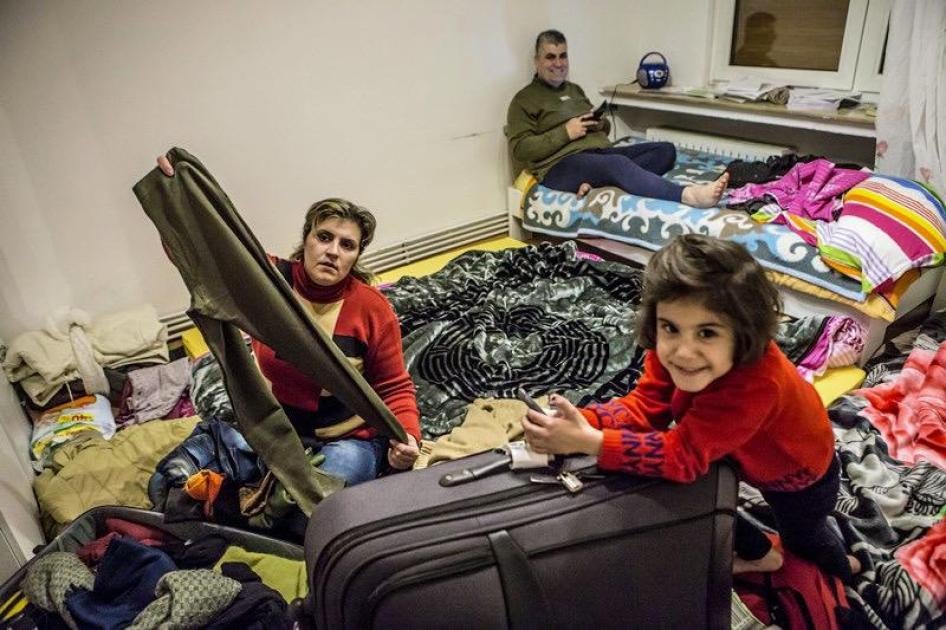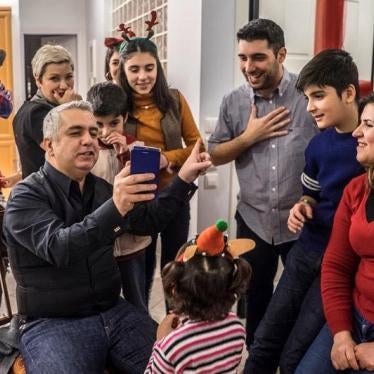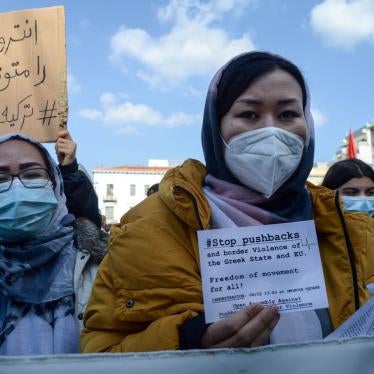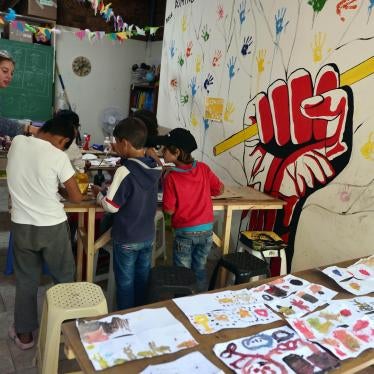This is the second of a two-part commentary on family reunification by Bethany Brown of Human Rights Watch and photojournalist Anna Pantelia that documents a Syrian family’s final days in Greece before heading to Germany to reunite with their father after nearly two years apart. Originally published at News Deeply.
“My heart is about to break,” said Falak, as she walked to the exit of the plane with her children in tow on an morning in early February.
The 38-year-old Syrian mother and her five children had flown from Athens to Dusseldorf, after spending nearly two years separated from her husband and their father Mohammed. He had since been granted refugee status in Germany and the family had been accepted for family reunification.
“Baba! Baba!” the oldest boy, also named Mohammed, shouted when he saw his father in the airport. He began to run and the rest of the family quickly followed.
Everyone’s eyes welled with tears. As they held each other tightly in long-awaited embraces, Falak wondered aloud, “Is it a dream or is it actually happening?”
Falak and Mohammed’s story has the dream-come-true ending that anyone would hope for after surviving persecution, war, open seas, vulnerability and waiting. Everything went right.
Many other asylum-seekers hoping to reunite with their families have not been so fortunate. Nearly 5,000 people, including 700 lone children, made family reunification requests in Greece in 2016, but only 1,107 of them have joined their families, according to the U.N.children’s fund.
Iza Papailiou, head of the Greek asylum service’s “Dublin Unit”, which implements the E.U.’s Dublin regulation on processing asylum seekers, describes numerous difficulties for family reunification.
She told Human Rights Watch that other asylum seekers have been misinformed, encountered legal and administrative blockages and had problems obtaining and verifying documentation or communicating across borders.
“It isn’t just about our administration or that of our counterparts – sometimes it’s difficult for applicants to submit documentation or we need documents from a relative in another state,” Papailiou said. “There are many legal issues. Sometimes they lose track of the relative. The authorities can’t find that person so we have to contact the applicants here in Greece, advising them to try to find them and go to the Asylum Service.
“And poor documentation of identity – a surname somehow written differently by the interpreter – can cause problems,” she added.
Every condition – timing, applications and charitable assistance – had to align perfectly for Falak and her children to get to this point.
Their family’s story would have been very different if it were not for two things.
Because Mohammed received full refugee status, the family was relatively easily reunified and they were all granted refugee status and permission to remain in Germany for three years after Mohammed arrived in 2015. After that, their residency permit can be reviewed.
Subsidiary protection is based on the European Commission’s
Qualification Directive of 2011, which says that a person is entitled to subsidiary protection if they cannot return to a home country because they “would
face a real risk of suffering serious harm” and are “unable or, owing to such risk, unwilling to avail himself or herself of the protection of that country.”
Subsidiary protection gives provisional protection but does not give beneficiaries full rights as refugees. It comes with a residence permit of one year instead of the three years given to people with refugee status and, from March 2016, those with subsidiary protection have no right to family reunification for two years.
The second way that time was on the family’s side was that Falak and the children arrived in Greece just days before the onset of the
E.U.-Turkey deal, an arrangement intended to stem the migration flow to Europe. Under the agreement, Greece should return all new arrivals on the Greek islands after March 20, 2016, to Turkey, including Syrians, on the questionable presumption that Turkey is what is known as a “safe” third country.
Although few of those who arrived since March 20, 2016 have actually been returned to Turkey, the fact that Falak and her children arrived just before the deal went into effect made it possible for them to leave Lesbos for the Greek mainland. It also gave a green light to the Greek Asylum Service and others to process their asylum claim and facilitate their departure to Germany.
Those who have arrived on the Greek islands since the deal went into effect are subject to different rules. More than a year later, thousands are still held on the islands,
in harsh conditions, living in fear of being forcibly sent to Turkey. Most have been denied meaningful access to asylum procedures and to the rights that would follow from being recognized as refugees.
At least
1,187 people have been forcibly returned from the Greek islands to Turkey since the deal went into effect. Some did not apply for asylum. Others withdrew their asylum application after a negative decision at their first hearing. And others were rejected after an examination of their cases on their merits – in procedures that many independent observers, including the U.N. refugee agency UNHCR, have found to have
irregularities.
So far, however, no one has been forcibly returned to Turkey on the grounds that their asylum application was inadmissible because they could obtain effective protection in Turkey – the cornerstone of the deal.
In Falak and Mohammed’s case, it also helped that their children were all young. If they had had adult children, they would not have been able to reunite in this way.
National laws and the E.U.’s Dublin regulation use a narrow definition of family for the purposes of reunification: a husband, wife and children under 18 years old. Human Rights Watch, Action Aid and other organizations working for the rights of refugees strongly support broadening the definitions of
family for the family reunification process beyond the nuclear family with minor children.
Falak and Mohammed still worry about the family they left behind. Mohammed has not heard any word of his older brother, who was trapped in Syria behind the sealed border to Turkey.
Falak has a sister, a brother, an uncle and grandparents in Germany. Her parents and another brother fled to Turkey about a year ago. They applied for resettlement in Germany. Her brother, who has a disability, lived with his parents before the war. They are still waiting to hear about their case.
The relationship between older parents and adult children is not normally recognized by national laws on family reunification. Member states of the European Union are failing to protect older mothers and fathers, grandmothers and grandfathers, who want to live out their days with their family. Under such a narrow definition of family, Falak’s parents have no right to be reunited with her or her adult siblings.
Family reunification is a reasonable aim for all refugees – one they ought to be able to aspire to and realize. On a basic human level, it relieves suffering, and all basic civil and political human rights standards – whether European or universal – have recognized a need to protect the family. It is time for the E.U. and its member states to address the gaps in protection for refugee families torn apart by their desperate struggle to reach safety.
